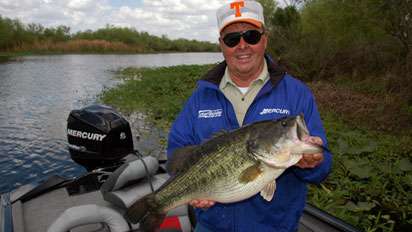
Ever noticed how just when you think you know all the rules required to catch bass, those darned fish go and rewrite the rulebook?
Change the rules? Heck, sometimes it can be more than that. Sometimes, I think they change to a completely new game altogether.
But, as I have said before, that frustration factor is what makes bass fishing so special — some days you win, some … er … more days you don’t. And really, I think that is the way the Lord intended.
Rewards only come via challenges, and how we approach such challenges can often determine the results and what we learn from them.
This makes me think of a time I was fishing a tournament on Sam Rayburn Reservoir. I was fishing schooling bass in flooded timber. The water was exceptionally clear, the sun was bright, and I was hooking bass on every three to four casts … fishing a transparent blue plastic worm.
All of a sudden the bass stopped.
My first reaction was to analyze what I was doing and what could cause the fish to quit biting. I couldn’t really find a sound answer, so I started fishing again, and, after a while, the bass started biting.
Then, once again, they stopped.
I was puzzled and sat there fishing for the answers when I noticed the sky’s puffy white clouds, and how every now and then, rather slowly, one of those would cover the sun. I also noticed when the clouds covered the sun, the fish quit biting.
Now, there was little wind, so the clouds moved slowly. When they quit biting, it was like the fish had left, but I suspected they hadn’t and that kept me from moving to another location.
Well, the sun popped out again and immediately in the next four casts, I caught a fish. The water was clear, the sun was bright.
As I mentioned, I was using a blue worm and I love to fish those. In fact, I have often said, “When you run out of blue plastic worms, you have run out of worms.”
I pondered all this and thought of the clouds covering the sun. In low-light, or even dark, periods, I like to fish black baits. So, out of curiosity, I tied a black plastic worm on another rod. Instantly, I got a bite on the black worm while the sun was covered by clouds.
With two rods, one with the black worm and one with the transparent blue, I would alternately fish as the clouds moved across the sun. As patterned, if the sun was out, the fish hit the blue worm and ignored the black. If the sun was hidden behind those big puffy clouds, the black worm would draw strikes while the blue worm would be ignored.
This taught me a lesson.
I believe in color selection while fishing. I believe fish see color, and some are seen better at some times than others. All the way back in the 1800s, ichthyologists discovered the sun governs the shape, size and color of anything in the water, be it forage, fish, objects, lures, whatever.
It could have been simply the way the light made the worm appear in the water that made the difference between getting bit and no strikes.
The scenario verified that being observant is the key. Try to figure things out when you are fishing. Through such on-the-water analysis, you’ll become a better fisherman. Don’t panic and move to another spot when things stop going your way. When the fish stop biting, simply start asking questions.
For me, overcoming such challenges (and rest assured you will face them nearly every trip) is one of the things that makes bass fishing such a tremendous sport.
For more words of wit and wisdom from one of our sport’s greatest legends, check out www.billdanceoutdoors.com.

